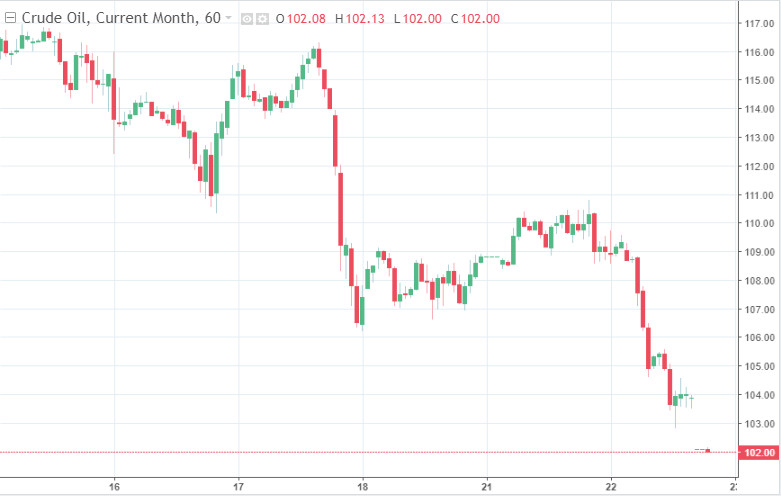Akcie společnosti Hudbay Minerals se v úterý před zahájením obchodování propadly o 4,8 %, protože těžař mědi oznámil zisk za druhé čtvrtletí, který nesplnil očekávání analytiků. Upravený zisk společnosti na akcii ve výši 0,00 USD zaostal za očekávanými 0,07 USD na akcii a tržby ve výši 425,52 mil. dolarů byly rovněž nižší než konsensuální odhad 461,9 mil. dolarů. Hudbay přičítá pokles produkce nižším plánovaným třídám v Peru a Manitobě a také plánovaným programům odstraňování starých slojí v dolech Pampacancha a Copper Mountain. Navzdory chybějícímu zisku společnost Hudbay zdůraznila svůj pokrok v oblasti snižování zadluženosti a snížení čistého dluhu o 405,9 milionu USD v první polovině roku. Společnost potvrdila svůj celoroční výhled produkce mědi a zlata na rok 2024 a očekává vyšší produkci ve druhé polovině roku, protože získá přístup k vyšším jakostem.
The price of oil fell by more than 5% during Wednesday's trading session. At the same time, the price of a barrel of Brent crude slipped below the psychological mark of $110 for the first time since the last week of May. The main reason for the panic on the market is investors' concerns about the prospects of an impending recession in the global economy.
Brent crude oil futures for August dropped by 5.09% to $108.9 a barrel. WTI futures for August futures lost 5.54% to trade at $103.44 a barrel.
By the way, earlier in the day, the oil market showed strong gains. By the end of Tuesday's trading, Brent contracts for August rose by 0.5% to $114.65 a barrel, while WTI contracts climbed by 1.4% to $109.52 a barrel.
Market pressure factors
The key reason for such a sharp decline in the commodities market on Wednesday was cited by analysts as investor concern that tight monetary policy by global central banks could trigger a recession in the global economy. In turn, a slowdown in economic growth will markedly reduce energy consumption.
By the way, market experts also share investors' fears. The day before, analysts at the Swiss economic institute KOF warned that the United States and eurozone countries could enter a recession in 2023.

Notably, the US Federal Reserve increased its key rate by 75 basis points at once to 1.50-1.75% at the end of its two-day meeting on June 14-15. The Fed has not enacted a hike of this size since 1994.
During the press conference following the US Federal Reserve meeting Jerome Powell also said that the base rate level could be increased by another 50-75 basis points next month.
Major central banks in Europe are also taking no less decisive steps in the fight against inflation. The Bank of England, for example, increased its policy rate by 0.25% for the fifth consecutive time since December 2021 at the end of last Thursday's meeting. The current rate of 1.25% p.a. was the highest in 13 years. Furthermore, the British central bank made a forecast of an acceleration of annual inflation in the country above 11% by October this year.
On the same day the Swiss National Bank unexpectedly increased its rate by 50 basis points to -0.25% per annum for the first time since 2007. Furthermore, the regulator said that it might increase rates again in the near future to stabilize inflation.
Only the Bank of Japan was an exception in this hawkish series of decisions by global regulators. At its monetary policy meeting on Friday morning, the central bank decided to stick to its strategy of keeping the yield on 10-year bonds at zero.
Oil market participants on Wednesday are focusing on expectations of weekly statistics from the US Department of Energy on the country's oil reserves. According to analysts' preliminary scenarios, crude stocks will drop by 1.4m barrels over the past week.
The American Petroleum Institute (API) will later provide its estimate of US oil production levels.
Trader interest today is also focused on the United States government's attempts to stop the permanent rise in gasoline prices. The New York Times reports that President Joe Biden will ask Congress on Wednesday to temporarily suspend the fuel tax (18.4 cents per gallon) until the end of September.
Today, refiners are having tangible problems meeting demand for diesel and gasoline. This, in turn, worsens the global price of oil and exacerbates the commodity market deficit. It is not only the key oil consumers (the US and Brazil), but also smaller countries (Ukraine and Sri Lanka) that are suffering.
Recently, demand for motor fuels has been increasing alongside a decline in refining capacity of about 1 million barrels per day. Since the start of the coronavirus pandemic, many refineries have been closed due to falling fuel demand under lockdowns and other restrictive measures.